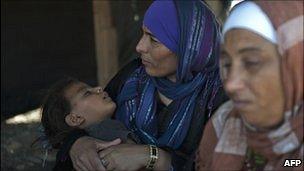Israel sues Bedouin for $500,000 in eviction costs
- Published

Bedouin in al-Araqib at a recent event to mark the anniversary of a major demolition by Israeli forces
Israel is suing a group of Bedouin in the Negev desert for the costs of demolishing their village each time they rebuild it.
The claim for more than $500,000 in damages was lodged at an Israeli court on Tuesday.
Israel's justice ministry says the aim is to "maintain the rule of law and the public purse".
The Bedouin say they will continue to reconstruct their homes in al-Araqib, to which they claim historic rights.
The Israeli state is the registered owner of the land to the south of the Negev city of Rahat.
The Bedouin say they have repeatedly asked for planning permits for their makeshift homes but they have been refused. The Israeli authorities say the land is reserved for agricultural use.
Last July, an eviction order was issued and Israeli security forces moved in to destroy 45 homes, animal pens and other structures.
Since then the Israeli authorities have demolished structures in al-Araqib more than 20 times. Each time, the Bedouin return and rebuild.
Bedouin defiance
Israel's justice ministry says the defendants have not respected legal rulings and continue to build illegally.
In a long statement it said the civil lawsuit was launched to reclaim the "heavy costs to the state" of demolitions - including the use of heavy equipment and police security.
The case brought by the Southern District Prosecution is directed at 34 people.
"What's happening is political at the end of the day," a Bedouin spokesman, Awad Abu Freih, told the BBC. "They want to scare us in order to prevent us from rebuilding. They want to make Araqib an example to others.
"But that will never happen. This court case will not deter us. We are going to rebuild again," he said.
Some 300 people are said to live in al-Araqib, about half of them children.
Rights groups have previously called for the Israeli government to stop the demolitions of homes of Bedouin citizens.
Human Rights Watch says that nearly 90,000 Palestinian Arab Bedouins in the Negev region of southern Israel live in dozens of unrecognised towns and villages.
- Published27 July 2010